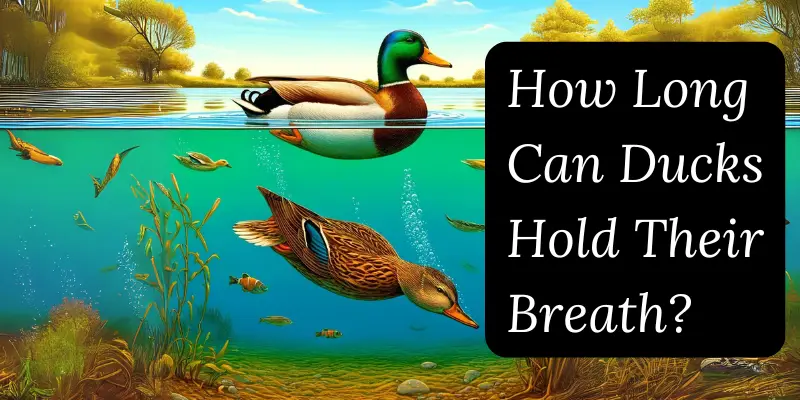How Long Can Ducks Hold Their Breath? Find the Answer
Updated: 1 Jan 2025
92

Ducks are fascinating creatures that thrive in watery environments thanks to their unique adaptations. Among these, their ability to hold their breath underwater is especially impressive. But how long can ducks hold their breath, and how do they do it? This guide dives into the science behind their abilities, comparing different duck species and exploring their remarkable survival strategies.
How Long Can Ducks Hold Their Breath?
Most ducks can hold their breath for about 10 to 15 seconds, while specialized diving ducks can hold their breath for up to a minute or more. This incredible skill allows them to search for food, escape predators, and explore underwater habitats.
The Science of How Ducks Hold Their Breath
Breath-Holding Abilities by Duck Type
Surface-Feeding Ducks
- Examples: Mallards, teal
- Breath-holding time: 10–15 seconds
- Why? These ducks rarely dive deep. They often dip their heads below the surface to grab vegetation or small insects.
Diving Ducks
- Examples: Mergansers, scaups, canvasbacks
- Breath-holding time: Up to 60 seconds or longer
- Why? Their bodies are optimized for diving with larger lungs, efficient oxygen use, and streamlined shapes.
How Ducks Maximize Their Oxygen Use
Ducks use several adaptations to hold their breath efficiently:
- Slowing Their Heart Rate: A physiological response called the “diving reflex” conserves oxygen.
- Oxygen Storage in Muscles: Ducks store oxygen in their blood and muscles for underwater use.
- Efficient Lungs: Their lungs absorb oxygen quickly, ensuring they’re ready for each dive.
Why Ducks Hold Their Breath
- Finding Food: Diving ducks often forage for underwater plants, fish, or insects.
- Escaping Predators: A quick dive can save a duck from danger, helping it avoid predators like hawks or foxes.
Can Ducks Drown?
While ducks are skilled swimmers, they are not immune to drowning. Ducks can drown in situations like:
- Becoming trapped in fishing nets or debris.
- Getting caught under ice during winter.
- Facing strong currents or waves in storms.
Ducks instinctively resurface before running out of oxygen, but accidents can happen.
Do ducks breathe underwater?
No, ducks cannot breathe underwater. They take a deep breath before diving and rely on stored oxygen.
Which duck species holds its breath the longest?
Diving ducks, like mergansers and pochards, are the champions of breath-holding, staying underwater for over a minute.
How long can mallards hold their breath?
Mallards can hold their breath for about 10 to 15 seconds—enough for short dives to forage near the water’s surface.
How do ducks stay dry underwater?
Ducks produce oil from a gland near their tails, which they spread over their feathers. This waterproof coating keeps them warm and buoyant.
Can I watch ducks dive underwater?
Yes! Visit lakes or wetlands where diving ducks are known to live. Use binoculars for an up-close view but maintain a respectful distance to avoid disturbing them.
Supporting Ducks in the Wild
- Avoid Littering: Fishing nets and debris can trap ducks underwater. Always clean up after fishing trips.
- Protect Habitats: Wetlands and lakes are critical for ducks. Support conservation efforts to preserve these areas.
Conclusion
Ducks’ ability to hold their breath is a testament to their adaptability and survival skills. While most ducks manage short dives, diving species can stay submerged for over a minute. This remarkable skill helps them thrive in their watery environments, whether they’re finding food or evading predators.
By understanding how ducks hold their breath and survive underwater, we can better appreciate these incredible birds and contribute to their protection.
Please Write Your Comments